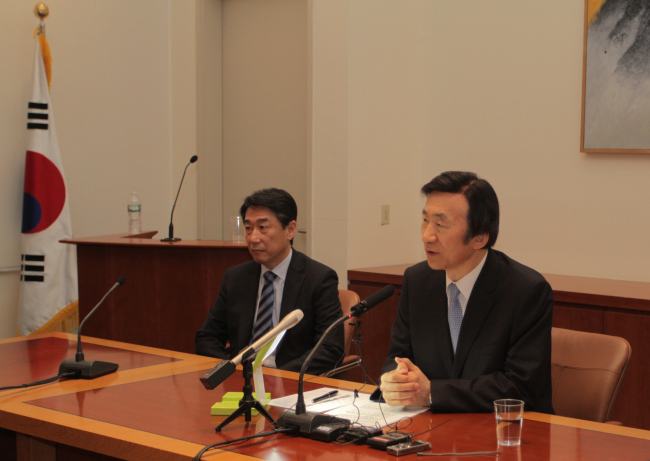South Korean Foreign Minister Yun Byung-se said Wednesday that the U.N. Security Council should adopt international sanctions for North Korea’s recent nuclear and rocket tests that are “way beyond its imagination” to completely end its persistent provocations.
During a meeting with reporters in New York, Yun stressed that Pyongyang’s repeated violations of UNSC resolutions through banned activities were an “affront to the authority of the Security Council.”
“This time, the UNSC sanctions resolution should put an end (to Pyongyang’s provocations),” he told reporters. “Sanctions should be way beyond the North Korean regime’s imagination and expectation.”
Yun was in New York to drum up international support for harsher sanctions against Pyongyang, which has been under intense criticism for its Jan. 6 nuclear test and Sunday’s rocket test, both of which contravened UNSC resolutions.
 |
| Ambassador to the U.N. Oh Joon attend a meeting with reporters in New York on Wednesday. (Yonhap) |
The UNSC has been working on drafting a fresh resolution of sanctions. Seoul, Washington and Tokyo have been pushing for “strong and comprehensive” sanctions, while Beijing and Moscow have been reluctant to adopt what they see as excessively strict sanctions.
Yun met with U.N. Secretary-General Ban Ki-moon and the diplomats of the 15 member nations of the Security Council to explain Seoul’s position on punitive measures for Pyongyang’s provocations and secure their support.
Seoul’s top diplomat also stressed the importance of bilateral sanctions, which would help strengthen the efficacy of international sanctions.
“Aside from the UNSC sanctions resolution, many countries are also adopting bilateral sanctions to pressure Pyongyang,” Yun said. “I anticipate that strong and impactful sanctions will be enforced as various penalties are implemented all together.”
A senior Seoul official said that many countries shared the need to cut off North Korea’s sources of hard currency that would be utilized for its nuclear and missile programs.
By Song Sang-ho (sshluck@heraldcorp.com)

